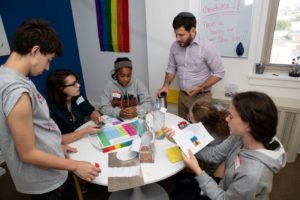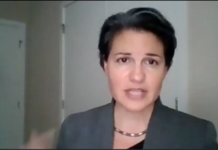For area Hebrew and religious schools, it’s the calm before the storm.
Though many will begin the school year a month or so after their secular counterparts, local education directors at synagogues have been hard at work this summer navigating the delta variant and planning the return to their classrooms, vacant after a year-and-a-half of Zoom Hebrew school.
“Our plan at the moment is never not a moving target,” said Abigail Weinberg, youth and families director at the Germantown Jewish Centre.
Religious schools are — for now — back in person. Though the format is a return to the familiar, schools are still making changes, trying to rebuild a feeling of community that atrophied over the past 18 months.
“It’s what our families really seem to want and need,” Congregation Rodeph Shalom Director of Youth Education Jennifer James said. “Because as effective as we can be over Zoom — and we were effective — there is a limit.”
The Philadelphia-based synagogue will resume Berkman Mercaz Limud, its learning center, Sept. 12, welcoming back more than 200 students to in-person classrooms.
Rodeph Shalom’s learning center has been lucky; attendance was strong during the pandemic year. It was able to adapt its in-person programming to an online format quickly.
Rabbi Max Nissen, director of youth and family education at Temple Beth Zion-Beth Israel, said they had a similar experience at BZBI’s Neziner Hebrew School.
“Our attendance was consistent enough to be able to run a strong program,” he said.
Nonetheless, Nissen acknowledged the absence of some students, and Weinberg saw the same at GJC; she noted the sizable difference in her religious school classes last year.
“That was painful, to not be able to serve them and include them,” Weinberg said.
Hebrew school students haven’t seemed to suffer in terms of learning: GJC’s online Wednesday Hebrew program was so successful that it will continue to be held weekly over Zoom this year. However, students’ experience of Hebrew school was hurt the most by the inability to connect in person with their peers.

For Levi Rudick, 16, the missing social component of religious school at GJC drove his decision not to attend GJC’s online program last year. Under non-pandemic circumstances, religious school offered a departure from the strictness of secular school.
“At least at GJC, it’s not as serious as school,” Rudick said. “After a week of serious school, it’s fun to play around.”
Sitting in front of a computer for religious school at the end of a school day began to feel like a continuation of school to Rudick. According to Denise Wolf, Rudick’s mother, even Rudick’s wrestling practice was virtual. Zoom fatigue after just a few weeks of religious school was too much for Rudick, and he decided he needed a break for the year.
“There was a lot of similarities between bland, virtual online school and [Hebrew school],” he said.
With GJC revamping in-person religious school this year, Rudick will return to the classroom on Sept. 12. Following the path of his two older brothers, Rudick, now fully vaccinated, will complete confirmation with the rest of his cohort, most of whom he’s known since the first grade.
“I kind of missed the company,” Rudick said. “We had a lot of fun times.”
Rudick hopes that this year, returning to an in-person format will allow him and his peers to engage with the classroom material at religious school.
Rudick’s mother is grateful the return of in-person learning will afford her son the opportunity to experience confirmation in the same way his older brothers did.
“His entire religious school experience kind of culminates in this 10th-grade program,” Wolf said. “I would have been really disappointed if it was virtual, and he couldn’t do it.”
Rudick isn’t the only student at GJC returning after a year away. According to Weinberg, of the 36 students currently enrolled, 11 are students who did not participate last year.
With the return of students, religious schools are making a special effort to focus on social-emotional learning this year.
“There’s a big push to think intentionally about how we come back together after a year of being apart,” Nissen said.
Religious schools made a concerted effort to try and build community over Zoom last year: Rodeph Shalom transferred its Panim el Panim (face-to-face) community-building activity to Zoom; BZBI continued its Rosh Chodesh and Shevet teen groups online; GJC hired outside organizations, such as the Bible Players, to create improv activities and skits with students to make the Zoom space more dynamic.
This year, the push continues to re-engage students in the classroom.
And along the way, BZBI will focus on supporting their teachers and encouraging them to focus on social-emotional and spiritual learning in the classroom, Nissen said.
“Rather than thinking of yourself as being in a classroom, students really feel like they’re part of a micro-community that they have a sense of ownership in,” he said.
Other religious school programs are hoping to do the same.
In previous years, GJC hosted an annual Havdalah and potluck from a student’s home. This year, it hopes to host three of these events. The Bible Players will have an in-person encore performance at GJC as well.
The ambitious goals are a sign of optimism for these religious schools.
“Our regular school is a place of a lot of energy,” Weinberg said. “We just need to come back together and remind people of it.”
[email protected]; 215-832-0741






